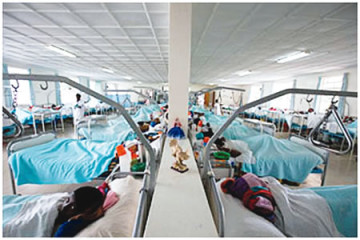Beware, harmful traditional practices can lead to fistula
Some people have described the woman’s body as a battleground of sorts. While this may sound like an exaggeration, the fact remains that many traditional practices don’t just violate a woman’s body through mutilations and other physical assaults, but they also inflict horrendous injuries that make childbirth a complicated and risky venture for victims.
What are some of these HTPs? Read on!
Female Genital Mutilation
Also known as female circumcision, FGM is an ancient cultural practice that is inflicted upon the girl-child, some as young as 24 hours and up to 12 years of age. Physicians say some children don’t survive the procedure and die of bleeding; while those who do survive may have signed a death warrant of sorts, as the practice is capable of making childbirth laborious.
How does this happen? Clinical Associate with Fistula Care Plus, Dr. Suleiman Zakariya, at a media workshop on fistula, says the injuries from FGM often leave females with difficulty urinating and menstruating, while the victims barely endure penile penetration during sexual intercourse.
“The horrific effects of FGM make having a normal birth impossible, as it usually leads to complications during child birth, contributing to the high maternal death rate and the unusually high rate of obstetric fistula that we see in this country,” Zakariya says.
The physician adds, “The consequences are devastating: after going through the agony of days of labour, the woman is left with a constant leaking of urine, faeces or both. Worse still, the child she was hoping to give birth to dies in the process.”
Indeed, according to the most recent statistics by the United Nations, because of the complications that come with obstetric fistula, women in sub-Saharan Africa – including Nigeria – are about 100 times more likely to die in labour than in developed countries. Indeed, a woman’s chance of dying from pregnancy and childbirth in Nigeria is said to be one in 13.
Again, Nigeria’s infant mortality rate remains one of the highest in the world. According to the CIA World Fact, 2014 edition, Nigeria records 74.09 deaths per 1,000 live births. Statistics say that every single day, 2,300 Nigerian children under the age of five die of various causes, including at birth.
Yet, experts say fistula is very avoidable, if only we could do away with certain traditional practices that inflict injuries on women.
Early marriage
The story of Zuera Mustapha is instructive. Married at age 14, she has experienced two stillbirths and a recurrent obstetric fistula resulting from difficult deliveries. In a sense, though, Zuera, now 21, has been luckier than her mother and sister, both of whom died of complications during childbirth.
While fistula also happens to older women for various reasons, the United Nations Population Fund warns that the condition is worsened by adolescent pregnancy.
A recent United Nations report states, “Girls who become pregnant before age 15 in low- and middle-income countries have double the risk of maternal death and obstetric fistula than older women.”
The report adds, “Childbirth is more likely to be difficult and dangerous for an adolescent than for an adult, because young adolescents do not yet have a fully developed pelvis. Consequently, pregnancy for them can result in serious consequences, such as eclampsia, premature labour, prolonged labour, obstructed labour, fistula, anaemia, infant and/or maternal death.”
Experts add that the risk of maternal death related to pregnancy and childbirth for adolescent girls between 15 and 19 years of age accounts for some 70,000 deaths each year.
“For adolescents under 15 years of age, these risks increase substantially, as girls who give birth before age 15 are five times more likely to die in childbirth than women in their 20s,” experts counsel. The advice here is that it is not advisable for a girl to have the first baby before she is 18 years old, when her body would be mature enough to undergo the stress of pregnancy and childbirth.
Gishiri cutting
For those who speak Hausa, ‘gishiri’ is the word for salt; however, it also a slang for the private part of both sexes. And, by the time you have the phrase, ‘yankan gishiri,’ you are talking of a local remedy for all sorts of ailments and conditions, including ‘remedy’ for pain during sex (dyspareunia), infertility, pelvic organ prolapse (dropped bladder, rectocele, uterine prolapse, etc.), prolonged labour and episiotomy.
At a media workshop on fistula sponsored by the United States Agency for International Development, gynaecologist/Country Project Manager, Engender Health/USAID Fistula Care Plus, Dr. Habib Sadauki, says gishiri cuts are usually made either by a barber with a knife, or a local birth attendant with a razor.
He says it is a longitudinal cut made either on the anterior or posterior vaginal, and these cuts can do damage, causing all sorts of injuries, including urinary or faecal incontinence from damage to the urethral or anal sphincters, or full thickness holes, or fistula between bladder and vagina, urethra and vagina, or rectum and vagina.
At the International Society of Obstetric Fistula Surgeons, Dr. Amir Yola says out of the 1,372 fistula patients he treated in Kano State, 78 (5.7 per cent) of the women’s fistula were the result of yankan gishiri, while the rest were as a result of prolonged obstructed labour.
Tomorrow, I will conclude this series by discussing how to make your pregnancy and childbirth risk-free.








